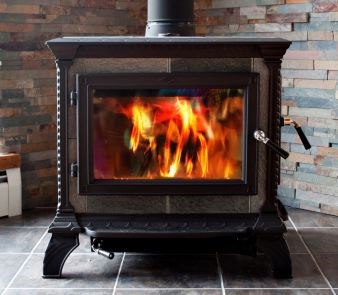A local program that encourages homeowners to exchange old wood stoves got $13,600 as part of a province-wide effort to improve air quality.
Through its program, the Prince George Air Improvement Roundtable offers a $500 rebate when owners purchase a new wood-burning, pellet or natural gas stove to replace an older model. New stoves burn through one-third less wood, the province Tuesday announcment said, and can reduce smoke and particulates entering the atmosphere by 70 per cent or more.
The partnership with the BC Lung Association, which administers the program, has helped replace more than 7,000 wood-burning stoves and inserts since 2008, the release said.
The province said in 2017 it hopes to meet this year's mark, with nearly 600 wood stoves exchanged. In 2015, Prince George exchanged 27 old stoves, 14 within the city and 13 in the surrounding Regional District of Fraser-Fort George, according to PG AIR numbers. The eight-year-old program has removed 340 from the regions and an estimated 340 tonnes of particulate matter emissions, it estimated.
Local MLAs said the approach offers a healthier alternative for homeowners.
"Air quality is important to Prince George residents and this program offers homeowners the opportunity to reduce air pollution and save money at the same time," said the Shirley Bond statement in Tuesday's press release. "By switching over to a high efficiency stove you can reduce the cost of heating your home and significantly reduce
smoke and particulates as well."
"By taking advantage of the rebate, the cost of replacement is covered in a short period of time just by burning less fuel to heat your home," added Mike Morris, MLA for Prince George-Mackenzie.
In September the province announced it would bring in new wood heating regulations to reduce air pollution. The regulation, which specifies particulate emission limits, and labeling and testing requirements, had not been changed since it was created in 1994.
Prince George has some of the worst results in B.C. when it comes to particulate matter levels.
"Over the years, Prince George had some of the highest levels of PM 10 and PM 2.5 in the province, and has been considered the primary pollutant to address in air quality management in the Prince George airshed," a September city report noted.
The city has several policies to reduce pollutants and in addition to wood-burning appliances, it regulates dust generation and sweeping, open burning and recreational fires. During particularly bad days, the city offers free fare on buses during air quality advisories in an attempt to shield the public from being outdoors too long. And each year city council gives PGAIR $70,000 each year, plus $50,000 for air quality monitoring and research.
But the city has seen "consistent improvement” over the last 15 years the report concluded.
Prince George was one of 14 communities in B.C. with similar programs that will get funding in 2017, including Coldstream and Strathcona Regional District which had never offered the exchange program before.
Tips on wood burning from the province:
- Always use dry well-seasoned wood cut into pieces that are 10-15cm in diameter. Burning "green" or wet wood produces significantly more smoke.
- Firewood should be seasoned for at least six months. Burning seasoned wood also saves money by reducing wood consumption by 25%.
- By burning smaller, hotter fires to ensure complete combustion of the wood, there should be very little visible smoke coming from the chimney and no smell of smoke indoors.
* Wood-burning appliances should be inspected and cleaned at least once a year by a certified technician.
The funding breakdown:
Regional District of Central Okanagan - $7,100
Regional District of Central Kootenay - $15,500
Regional District of Kootenay Boundary - $6,500
Prince George Air Improvement Roundtable - $13,600
Bulkley Valley and Lakes District Airshed Management Society - $8,700
District of Coldstream - $14,000
Metro Vancouver - $15,500
Sunshine Coast Clean Air Society - $9,500
Regional District of Nanaimo - $19,750
Alberni-Clayoquot Regional District - $15,600
Strathcona Regional District - $13,400
Comox Valley Regional District - $17,100
Golden and District Air Quality Committee - $11,000
Cowichan Valley Regional District - $22,750



